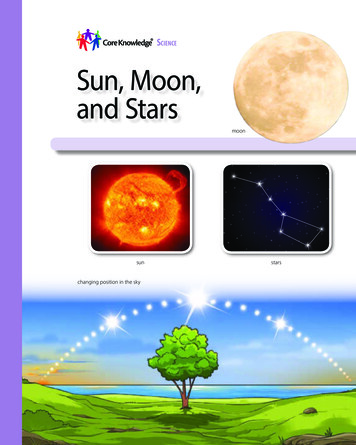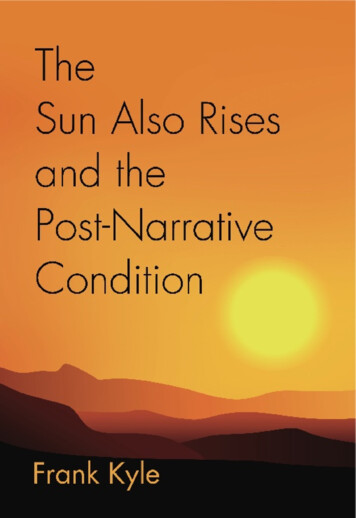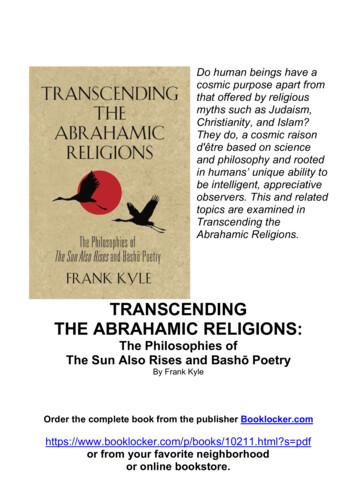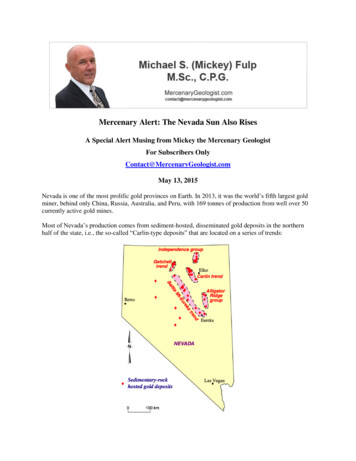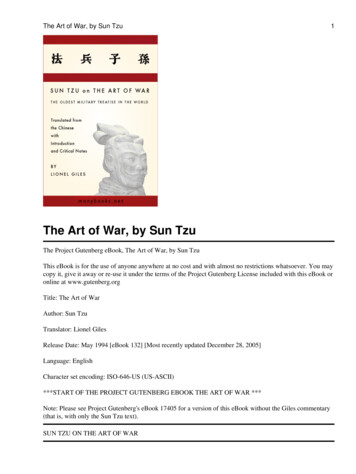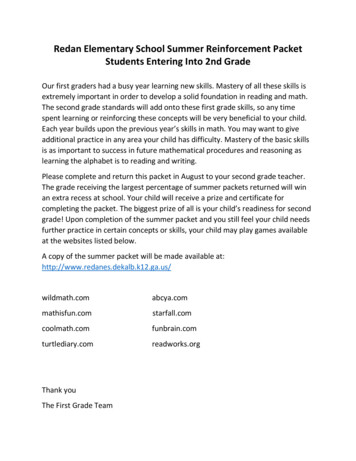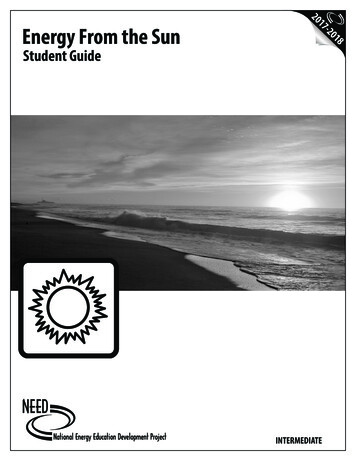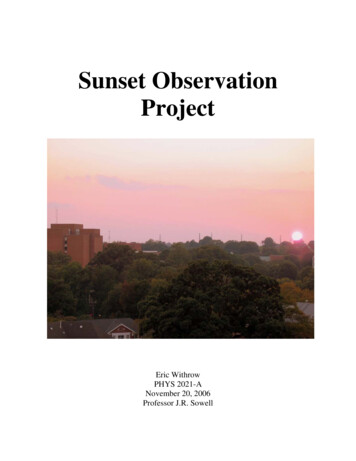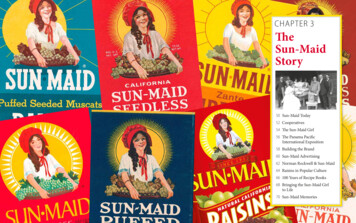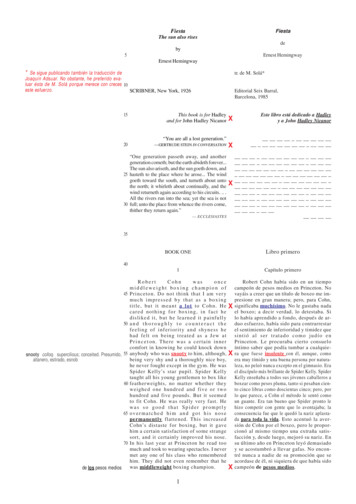
Transcription
Hemingway’s Suntr. de M. SoláFiestaFiestaThe sun also risesdebyErnest Hemingway5Ernest Hemingway* Se sigue publicando también la traducción detr. de M. Solá*Joaquín Adsuar. No obstante, he preferido evaluar ésta de M. Solá porque merece con creces 10este esfuerzo.SCRIBNER, New York, 1926Editorial Seix Barral,Barcelona, 198515This book is for Hadleyand for John Hadley Nicanor20—GERTRUDE STEIN IN CONVERSATIONXEste libro está dedicado a Hadleyy a John Hadley NicanorX“You are all a lost generation.”“One generation passeth away, and anothergeneration cometh; but the earth abideth forever.The sun also ariseth, and the sun goeth down, and25 hasteth to the place where he arose. The windgoeth toward the south, and turneth about untothe north; it whirleth about continually, and thewind returneth again according to his circuits. . .All the rivers run into the sea; yet the sea is not30 full; unto the place from whence the rivers come,thither they return again.”X— ECCLESIASTES35BOOK ONELibro primero1Capítulo primeroRobertCohnwasoncemiddleweight boxing champion ofPrinceton . D o n o t t h i n k t h a t I a m v e r ymuch impressed by that as a boxingtitle, but it meant a lot to Cohn. Hecared nothing for boxing, in fact hedisliked it, but he learned it painfullyand thoroughly to counteract thefeeling of inferiority and shyness hehad felt on being treated as a Jew atP r i n c e t on. There was a certain innercomfort in knowing he could knock downanybody who was snooty to him, although,being very shy and a thoroughly nice boy,he never fought except in the gym. He wasSpider Kelly’s star pupil. Spider Kellytaught all his young gentlemen to box likefeatherweights, no matter whether theyweighed one hundred and five or twohundred and five pounds. But it seemedto fit Cohn. He was really very fast. Hewas so good that Spider promptlyovermatched him and got his nosepermanently flattened. This increasedCohn’s distaste for boxing, but it gavehim a certain satisfaction of some strangesort, and it certainly improved his nose.In his last year at Princeton he read toomuch and took to wearing spectacles. I nevermet any one of his class who rememberedhim. They did not even remember that hewas middleweight boxing champion.Robert Cohn había sido en un tiempocampeón de pesos medios en Princeton. Novayáis a creer que un título de boxeo me impresione en gran manera; pero, para Cohn,significaba muchísimo. No le gustaba nadael boxeo; a decir verdad, lo detestaba. Silo había aprendido a fondo, después de arduo esfuerzo, había sido para contrarrestarel sentimiento de inferioridad y timidez quesintió al ser tratado como judío enPrinceton. Le procuraba cierto consueloíntimo saber que podía tumbar a cualquiera que fuese insolente con él, aunque, comoera muy tímido y una buena persona por naturaleza, no peleó nunca excepto en el gimnasio. Erael discípulo más brillante de Spider Kelly. SpiderKelly enseñaba a todos sus jóvenes caballeros aboxear como pesos pluma, tanto si pesaban ciento cinco libras como doscientas cinco; pero, porlo que parece, a Cohn el método le sentó comoun guante. Era tan bueno que Spider pronto lehizo competir con gente que lo aventajaba; laconsecuencia fue que le quedó la nariz aplastada para toda la vida. Esto acentuó la aversión de Cohn por el boxeo, pero le proporcionó al mismo tiempo una extraña satisfacción y, desde luego, mejoró su nariz. Ensu último año en Princeton leyó demasiadoy se acostumbró a llevar gafas. No encontré nunca a nadie de su promoción que seacordase de él, ni siquiera de que había sidocampeón de pesos medios.404550snooty colloq. supercilious; conceited. Presumido, 55altanero, estirado, esnob606570de los pesos medios1XXX
Hemingway’s SunI mistrust all frank and simple people,especially when their stories holdtogether, and I always had a suspicion that5 perhaps Robert Cohn had never beenmiddleweight boxing champion, and thatperhaps a horse had stepped on his face,or that maybe his mother had beenfrightened or seen something, or that he10 had, maybe, bumped into something as a youngchild, but I finally had somebody verify thestory from Spider Kelly. Spider Kelly notonly remembered Cohn. He had oftenen qué se había convertido / qué había sido de élwondered what had become of him.15Robert Cohn was a member, through hisfather, of one of the richest Jewish familiesin New York, and through his mother of oneof the oldest. At the military school where20 he prepped for Princeton, and played a verygood end on the football team, no one hadmade him race-conscious. No one had evermade him feel he was a Jew, and hence anydifferent from anybody else, until he went25 to Princeton. He was a nice boy, a friendlyboy, and very shy, and it made him bitter.He took it out in boxing, and he came outof Princeton with painful selfconsciousness and the flattened nose, and30 was married by the first girl who was niceto him. He was married five years, had threechildren, lost most of the fifty thousanddollars his father left him, the balance ofthe estate having gone to his mother,35 hardened into a rather unattractive mouldunder domestic unhappiness with a richwife; and just when he had made up hismind to leave his wife she left him and wentoff with a miniature-painter. As he had been40 thinking for months about leaving his wifeand had not done it because it would be toocruel to deprive her of himself, hershock conmoción, sacudida, descarga, prostracióndeparture was a very healthful shock.45tr. de M. SoláDesconfío de todas las personas francas ysencillas, especialmente cuando sus historiasparecen tener lógica, y siempre me quedé conla sospecha de que tal vez Robert Cohn no había sido nunca campeón de pesos medios; quizá un caballo le había pisado la cara, o quizá sumadre había tenido un susto o había visto algo,o quizá él, de niño, se había dado un porrazo.Pero al fin encontré a alguien que consiguiócomprobar aquella historia preguntándosela almismo Spider Kelly. Spider Kelly no sólo recordaba a Cohn, sino que se había preguntadoa menudo qué se había hecho de él.Robert Cohn pertenecía a una de las familias judías más ricas de Nueva York, por partede su padre, y a una de las más antiguas, porparte de su madre. En la escuela militar dondese preparó para entrar en Princeton y fue almismo tiempo un excelente extremo del equipo de fútbol, nadie le había hecho tomar conciencia de su raza. Nadie le había hecho sentirque era judío y distinto, por tanto, a todos losdemás, hasta que fue a Princeton. Era un muchacho amable, afectuoso y muy tímido, y eseasunto le amargó la vida. Se desahogó boxeando, y salió de Princeton con un penoso complejo de inferioridad y con la nariz aplastada.Se casó con la primera chica que fue amablecon él. Estuvo casado durante cinco años, tuvotres hijos, perdió la mayor parte de los cincuentamil dólares que su padre le había dejado —elresto de los bienes había ido a parar a su madre— y se templó en el poco atractivo moldede la infelicidad doméstica con una mujer rica.Y, precisamente cuando hubo tomado la resolución de dejar a su mujer, fue ella quien le dejóa él, largándose con un miniaturista. Como había estado pensando meses y meses en dejarlay no lo había hecho por considerar demasiadocruel privarla de su compañía, su partida le ocasionó un shock muy saludable.The divorce was arranged and RobertCohn went out to the Coast. In Californiahe fell among literary people and, as hestill had a little of the fifty thousand left,in a short time he was backing a review50 o f t h e A r t s . T h e r e v i e w c o m m e n c e dpublication in Carmel, California, andfinished in Provincetown, Massachusetts.By that time Cohn, who had beenregarded purely as an angel, and whose55 name had appeared on t h e e d i t o r i a l p a g emerely as a member of the advisor yboard, had become the sole editor.It was his money and he discovered heliked the authority of editing. He wasbecame se volvió 60 sorry when the magazine became t o oexpensive and he had to give it up.Se tramitó el divorcio y Robert Cohn semarchó a la costa. En California fue a parar enun grupo de gente de letras y, como le quedabatodavía algo de los cincuenta mil que heredó,al cabo de poco tiempo estaba subvencionandouna revista artística, que empezó a publicarseen Carmel, California, y acabó enProvincetown, Massachusets. Por aquella época, Cohn, que hasta entonces había sido considerado sólo como un mecenas y cuyo nombrehabía aparecido únicamente en la primera página, en calidad de miembro de la junta consultiva, se había convertido en redactor único.El dinero era suyo, y descubrió que le gustabala autoridad que confería el ser redactor. Cuando la revista resultó demasiado cara y tuvo querenunciar a ella, lo sintió.By that time, though, he had otherthings to worry about. He had been65 taken in hand by a lady who hoped to risewith the magazine. She was very forceful, andforcible or forceful adj.1 vigorous, powerful.2 (of speech) compelling, impressive. Vivo,Cohn never had a chance of not being takenenérgico, vigoroso, convincente, effective,in hand. Also he was sure that he loved her.contundenteWhen this lady saw that the magazine was70 not going to rise, she became a little disgustedwith Cohn and decided that she might as wellget what there was to get while there was stillsomething available, so she urged that theygo to Europe, where Cohn could write. TheyEn aquellos momentos, sin embargo, eran otraslas cosas que le preocupaban. Una dama, que esperaba ascender con la revista, le había echado el lazo;era muy enérgica y Cohn no tenía ni unasola posibilidad de evitar que le manejara. Además, estaba seguro de que la quería. Cuando ladama en cuestión vio que la revista no se levantaría, se disgustó un poco con Cohn, y decidió que más valía obtener lo que fuera posible mientras quedara todavía algo por adquirir.De modo que insistió para que se marcharan aEuropa; allí Cohn podría escribir. Fueron a2
Hemingway’s Suntr. de M. Solácame to Europe, where the lady had beeneducated, and stayed three years. During thesethree years, the first spent in travel, the lasttwo in Paris, Robert Cohn had two friends,mejor ‘tenía’, porque uno todavía lo tiene5 Braddocks and myself. Braddocks was hisliterary friend. I was his tennis friend.Europa, donde la dama había sido educada, yse quedaron tres años, de los cuales pasaronuno viajando y los dos restantes en París. Durante este tiempo Cohn tuvo dos amigos,Braddocks y yo: Braddocks era su amigo literario, yo su amigo de tenis.The lady who had him, her name wasFrances, found toward the end of the secondyear that her looks were going, and herattitude toward Robert changed from oneof careless possession and exploitation to theabsolute determination that he should marryher. During this time Robert’s mother hadsettled an allowance on him, about threehundred dollars a month. During two yearsand a half I do not believe that Robert Cohnlooked at another woman. He was fairlyhappy, except that, like many people livingin Europe, he would rather have been inAmerica, and he had discovered writing. Hewrote a novel, and it was not really such abad novel as the critics later called it,although it was a very poor novel. He readmany books, played bridge, played tennis,and boxed at a local gymnasium.La dama que lo tenía en sus manos, yque se llamaba Frances, descubrió, a finesdel segundo año, que su belleza se iba marchitando, y su actitud para con Robert pasóde una despreocupada posesión y explotación a la decisión irrevocable de que él tenía que casarse con ella. Por esta época lamadre de Robert Cohn le había fijado unaasignación mensual de unos trescientos dólares. Durante dos años y medio, no creo queRobert Cohn mirara a otra mujer. Era razonablemente feliz, con la excepción de que,al igual que muchos que viven en Europa,hubiera preferido estar en América, y habíadescubierto el arte de escribir. Compuso unanovela que, en realidad, no era tan malacomo dijeron más tarde los críticos, aunquesí muy pobre. Leía mucho, jugaba al bridgey boxeaba en un gimnasio local.10absolute es un adjetivo de moda en EEUU que nosolo traduce absoluto [independiente, decisivo, ilimitado, terminante, categórico], sino otros concep- 15tos más o menos similares, como total, completo,verdadero, pleno, perfecto, rotundo, incondicional,indiscutible, auténtico. El adverbio absolutely esabsolutamente, y sigue los pasos del adjetivo enfrecuencia y en significados.An absolute idiot un perfecto idiota.20An absolute goddess toda una diosa.Absolute nonsense pura tontería.This cathedral is an absolute jewel. Esta catedrales una verdadera joya.The newlyweds enjoy absolute happiness. Los recién casados gozan de completa felicidad.25You can rely on my absolute support. Cuenta conmi apoyo incondicional.He’s an absolute coward. Es un perfecto cobarde.I first became aware of his lady’s attitudetoward him one night after the three of us had30 dined together. We had dined at l’Avenue’s andafterward went to the Café de Versailles forcoffee. We had several fines after the coffee, Xand I said I must be going. Cohn had beengoing off hacer una escapadatalking about the two of us going off35 somewhere on a weekend trip. He wanted toget out of town and get in a good walk. Isuggested we fly to Strasbourg and walk up toSaint Odile, or somewhere or other in Alsace.“I know a girl in Strasbourg who can show us40 the town,” I said.Alguien me dio un puntapié por debajo de lamesa. Creí que había sido sin querer y continué:—Hace dos años que está allí y sabe todolo que hay que saber sobre la ciudad. Es unachica estupenda.I was kicked again under the table and,looking, saw Frances, Robert’s lady, her chin50 lifting and her face hardening.Me dieron otro puntapié por debajo de lamesa; miré y vi a Frances, la dama de Robert,con la barbilla levantada y el rostro endurecido.“Hell,” I said, “why go to Strasbourg?We c o u l d g o u p t o B r u g e s , o r t o t h eArdennes.”—E n f i n —dije — , ¿ p o r q u é i r aEstrasburgo? Podemos ir a Brujas o a lasArdenas.Cohn looked relieved. I was notkicked again. I said good-night andwent out. Cohn said he wanted tobuy a paper a n d w o u l d w a l k to the60 c o r n e r with me. “For God’s sake,” he said,“why did you say that about that girl inStrasbourg for? Didn’t you see Frances?”Cohn pareció quitarse un peso de encima y yono volví a recibir ningún puntapié. Di las buenasnoches y salí. Cohn dijo que quería comprar unperiódico y que me acompañaría hasta la esquina.—¡Por Dios! —dijo—, ¿a santo de quéhas dicho lo de la chica de Estrasburgo? ¿Esque no te has fijado en Frances?“No, why should I? If I know65 a n A m e r i c a n g i r l t h a t l i v e s i nStrasbourg what the hell is it toFrances?”—No. ¿Por qué razón tenía queocurrírseme? Si conozco a una chica americana que vive en Estrasburgo, ¿qué caray tieneque ver eso con Frances?“It doesn’t make any difference. Any girl. I70 couldn’t go, that would be all.”—Tanto da una como otra. Cualquier chica. No podré ir, eso es todo.55“Don’t be silly.”—No seas imbécil.“You don’t know Frances. Any girl at—Tú no conoces a Frances. Absolutamen-3 Me di cuenta por primera vez de la actitud de su dama para con él una noche enque, tras haber cenado los tres juntos en elAvenue, fuimos al Café Versailles, a tomarcafé y, después de u n o s c u a n t o s f i n e s ,dije que iba a marcharme. Cohn habíahablado de irnos los dos de viaje a algún sitio unfin de semana. Quería salir de la ciudad y dar unabuena caminata. Sugerí que podíamos ir en avión hasta Estrasburgo y desde allí llegar andando hasta SainteOdile o cualquier otro lugar de Alsacia.—En Estrasburgo conozco a una chica quenos puede enseñar la ciudad —dije.Somebody kicked me under the table. Ithought it was accidental and went on:“She’s been there two years and knows45 everything there is to know about the town.She’s a swell girl.”Hell Demonios, Diablos
Hemingway’s Suntr. de M. Soláall. Didn’t you see the way she looked?”te todas las chicas. ¿No viste qué cara ponía?“ O h , w e l l , ” I s a i d , “ l e t ’s g o t oSenlis.”—¡Oh, está bien! —dije—. Vayamos aSenlis, pues.5“Don’t get sore.”—No te enfades.“I’m not sore. Senlis is a good placeand we can stay at the Grand Cerf and take10 a hike in the woods and come home.”—No estoy enfadado. Senlis es un buen sitio; podemos hospedarnos en el Grand Cerf, daruna caminata por los bosques y volver a casa.“Good, that will be fine.”—Bueno, eso estará bien.“Well, I’ll see you to-morrow at thecourts pistas, cancha referido a tenis 15 courts,” I said.— E n f i n , t e v e r é m a ñ a n a e n elcampo.“Good-night, Jake,” he said, and startedback to the café.—Buenas noches, Jake —dijo, y echó aandar hacia el café.20“You forgot to get your paper,” I said.X“That’s so.” He walked with me up tothe kiosque at the corner. “You are not sore,are you, Jake?” He turned with the paper in25 his hand.* Las repeticiones de vocablos y frases soninusualmente prolijas a lo largo de todo eltexto inglés. No es que Hemingway anduviese escaso de alternativas. A medida quenos adentramos en las vidas de los protagonistas no sólo hablan así sino que el narrador también toma su punto de vista y esrepetitivo. Con ello se recalca el estatismoo el inmovilismo evolutivo de las vidas delos protagonistas a pesar de sus intensasaventuras. Estas repeticiones no se llevana la traducción con el debido rigor. Véasecualquier página y de forma especial la 51,52 y 53, donde se puede comprobar esteprolijo recurso narrativo. En un cierto momento el recurso se convierte en habitual ypercibimos que su repetición es lo queagavilla insistentemente los episodiosdeslavazados de unas vidas y que se convierte también en el único y auténtico amarre estructural de la novela; una estructuranarrativa más compacta no reflejaría ni tendría ese mismo efecto ni llamaría la atención sobre la «vanity and chasing after thewind» de las vidas de los protagonistas [Alusión al Eclesiatés de los prolegómenos cuyacita no se incluya en la versión castellana]al igual que ese sentido de «pérdida» quetambién acompaña sus vidas [y a la que sehace referencia en la cita de Stein sobre«lost generation» que tampoco se incluye].“No, why should I be?”—Te has olvidado del periódico.—Es verdad.Anduvo conmigo hasta el quiosco de la esquina.—No te has molestado, ¿verdad, Jake?—preguntó volviéndose con el periódico enla mano.—No, ¿por qué iba a hacerlo?“See you at tennis,” he said. I30 w a t c h e d h i m w a l k b a c k t o t h e c a f éholding his paper. I rather likedhim and evidently she led himquite a life.—Nos veremos en el tenis —dijo.Le observé mientras volvía al café con superiódico. Le tenía bastante simpatía, y era evidente que la vida que ella le proporcionaba noera lo que se dice una delicia.35402That winter Robert Cohn went over toAmerica with his novel, and it was acceptedby a fairly good publisher. His going made45 an awful row I heard, and I think that waswhere Frances lost him, because severalwomen were nice* to him in New York, andwhen he came back he was quite changed.He was more enthusiastic about America50 than ever, and he was not so simple, and hewas not so nice. The publishers had praisedhis novel pretty highly and it rather went tohis head. Then several women had putthemselves out to be nice to him, and hisSe pierde el caracter repetitivo que pretende darse 55 horizons had all shifted. For four years hiscon ‘nice’, ‘America’ y ‘horizon’.horizon had been absolutely limited to hiswife. For three years, or almost three years,absolute es un adjetivo de moda en EEUU que nosolo traduce absoluto [independiente, decisivo,he had never seen beyond Frances. I am sureilimitado, terminante, categórico], sino otros conhe had never been in love in his life.ceptos más o menos similares, como total, com- 60pleto, verdadero, pleno, perfecto, rotundo, inconHe had married on the rebounddicional, indiscutible, auténtico. El adverbiofrom the rotten time he had in college,absolutely es absolutamente, y sigue los pasosand Frances took him on the rebounddel adjetivo en frecuencia y en significados.An absolute idiot un perfecto idiota.from his discovery that he had notAn absolute goddess toda una diosa.65 b e e n e v e r y t h i n g t o h i s f i r s t w i f e . H eAbsolute nonsense pura tontería.was not in love yet but he realized thatThis cathedral is an absolute jewel. Esta catedralhe was an attractive quantity toes una verdadera joya.women, and that the fact of a womanThe newlyweds enjoy absolute happiness. Los recaring for him and wanting to live withcién casados gozan de completa felicidad.You can rely on my absolute support. Cuenta con 70 h i m w a s n o t s i m p l y a d i v i n e m i r a c l e .mi apoyo incondicional.This changed him so that he was notHe’s an absolute coward. Es un perfecto cobarde.so pleasant to have around. Also,playing for higher stakes than he couldafford in some rather steep bridge4Capítulo IIXXAquel invierno Robert Cohn se fuea América con su novela que le fue aceptadapor un buen editor. Su marcha originó, al parecer, una terrible pelea. Creo que fue entonces cuando Frances lo perdió, pues en NuevaYork varias mujeres fueron amables con él yregresó muy cambiado. Estaba más entusiasmado que nunca con los Estados Unidos, yno era ya ni tan sencillo ni tan amable. Loseditores habían alabado en gran manera sunovela, y eso se le había subido a la cabeza.Además, diversas mujeres se habían desvivido por serle agradables, cosa que trastocó todos sus horizontes. Durante cuatro añosse había limitado exclusivamente a sumujer, y durante tres más, o casi tres, no habíavisto más allá de Frances. Estoy seguro de quejamás en su vida se había enamorado.Se había casado de rechazo, como reaccióncontra el cochino tiempo que había pasado enla Universidad, y Frances lo pescó también derechazo, cuando él se dio cuenta de que no lohabía sido todo para su primera mujer. No esque estuviera enamorado todavía, pero comprobaba que era un polo de atracción para las mujeres, y que el hecho de que una se preocuparapor él y quisiera vivir con él no era sencillamente un milagro del cielo. Eso le hizo cambiar de tal forma que ya no resultaba tan agradable estar a su lado. Por otra parte, en una serie de partidas de bridge con sus amistades deNueva York, en las que se jugaban cantidades
Hemingway’s Suntr. de M. Solág a m e s w i t h h i s N e w Yo r k c o n n e c t i o n s ,he had held cards and won severalhundred dollars. It made him rathervain of his bridge game, and he talked5 several times of how a man couldalways make a living at bridge if hewere ever forced to.algo superiores a lo que le permitían sus medios económicos, hizo apuestas y la cosa le salió bien, por lo que se embolsó unos cuantoscentenares de dólares. Desde entonces se envanecía de su bridge y decía a menudo que unhombre puede siempre ganarse la vida con él,en caso de que se vea forzado a hacerlo.Then there was another thing. He had10 been reading W. H. Hudson. That soundslike an innocent occupation, but Cohn hadread and reread “The Purple Land.” “ThePurple Land” is a very sinister book ifread too late in life. It recounts splendidamorous apasionado 15 i m a g i n a r y a m o r o u s a d v e n t u re s o f aperfect English gentleman in an intenselyromantic land, the scenery of which isvery well described. For a man to takeit at thirty-four as a guide-book to what20 l i f e h o l d s i s a b o u t a s s a f e a s i t w o u l dbe for a man of the same age to enterWa l l S t r e e t d i r e c t f r o m a F r e n c hconvent, equipped with a complete setof the more practical Alger books.25 C o h n , I b e l i e v e , t o o k e v e r y w o r d o f“The Purple Land” as literally as thoughit had been an R. G. Dun report. Youunderstand me, he made somereservations, but on the whole the book30 to him was sound. It was all that wasneeded to set him off. I did not realize theextent to which it had set him off untilse rompe el lirismo y el ritmo cadenciosoone day he came into my office.Además, había otra cosa: se había dedicado a leer a W. H. Hudson. Eso parece a simplevista una ocupación inocente. Pero es que Cohnhabía leído y releído The purple land. Thepurple land es un libro sumamente funesto siuno lo lee demasiado tarde en la vida. Narralos espléndidos amores imaginariosde un intachable gentleman inglés en un paísextraordinariamente romántico, de paisajes muybien descritos. Que un hombre lo adopte a lostreinta y cuatro años como guía para todos losaspectos de la vida, resulta aproximadamentetan peligroso como lo sería para un hombre dela misma edad pasar directamente de un convento francés a Wall Street, equipado con unacolección completa de los más prácticos librosde Alger. Creo que Cohn se tomó cada una delas palabras de The purple land en sentido tanliteral como si se tratara de un informe de R. G.Dun. Entendámonos bien; hizo algunas salvedades, pero, en conjunto, el libro le pareció intachable. Era todo lo que se necesitaba paradispararlo. N o m e d i c u e n t a d e l g r a d oe n q u e lo había excitado hasta un día enque se me presentó en el despacho.35XX“Hello, Robert,” I said. “Did you comein to cheer me up?”—Hola, Robert —dije—. ¿Has venido adarme ánimos?“Would you like to go to South America,Jake?” he asked.—¿Te gustaría ir a Sudamérica, Jake? —me preguntó.40“No.”—No.“Why not?”—¿Por qué no?“I don’t know. I never wanted to go.Too expensive. You can see all the SouthAmericans you want in Paris anyway.”—No lo sé. Nunca he tenido ganas de ir.Demasiado caro. Además, en París uno puedever a todos los sudamericanos que quiera.“They’re not the real South Americans.”—No son los auténticos sudamericanos.“They look awfully real tome.”—Pues a mí me parecen terriblemente auténticos.I had a boat train to catch with a55 w e e k ’s m a i l s t o r i e s , a n d o n l y h a l f o fthem written.Tenía que llevar al barco correo un paquetecon las narraciones de aquella semana y habíaescrito sólo la mitad.45506065“Do you know any dirt?” I asked.—¿Sabes algo sucio? —pregunté.“No.”—No.“None of your exalted connectionsgetting divorces?”—¿No se divorcia ninguna de tus amistades de alto copete?“No; listen, Jake. If I handled bothour expenses, would you go to SouthAmerica with me?”—No. Oye, Jake, si yo pagase los gastosde los dos, ¿querrías venir conmigo aSudamérica?“Why me?”X70—¿Por qué precisamente yo?“You can talk Spanish. And it would bemore fun with two of us.”—Porque hablas español. Y los dos juntosnos divertiríamos más.“No,” I said, “I like this town and I go—No —dije—. Me gusta esta ciudad, y en5
Hemingway’s Suntr. de M. Soláverano me voy a España.to Spain in the summertime.”“All my life I’ve wanted to go on a triplike that,” Cohn said. He sat down. “I’ll5 be too old before I can ever do it.”—Toda mi vida he querido hacer un viajecomo éste —dijo Cohn sentándose—. Y, cuando pueda, ya seré demasiado viejo.“Don’t be a fool,” I said. “You can goanywhere you want. You’ve got plenty ofmoney.”—No seas estúpido —repliqué—.Puedes ir adonde quieras. Tienes dinero de sobra.“I know.started.”get—Ya lo sé. Pero no soy capaz de ponermeen marcha.“Cheer up,” I said. “All countries look15 just like the moving pictures.”—No te lo tomes tan a pecho —dije—. Verpaíses es lo mismo que ir al cine.But I felt sorry for him. He had itbadly.Pero me dio lástima. Se le presentaban mallas cosas.“I can’t stand it to think my life isgoing so fast and I’m not really livingit.”—No puedo soportar la idea de que mi vidase va con tanta rapidez y yo no la vivo realmente.“Nobody ever lives their life all the way25 up except bullfighters.”—Nadie vive su vida hasta apurarla, excepto los toreros.“I’m not interested in bull-fighters.That’s an abnormal life. I want to go backin the country in South America. We could30 have a great trip.”—No me interesan los toreros. Es una vidaanormal. Quiero volver a la vida en contactocon la naturaleza, en Sudamérica. Podríamoshacer un gran viaje.“Did you ever think about going toBritish East Africa to shoot?”—¿No has pensado nunca en ir a cazar alÁfrica Oriental Inglesa?102035ButIcan’t“No, I wouldn’t like that.”—No, no me gustaría.“I’d go there with you.”—Ahí sí que te acompañaría.“No; that doesn’t interest me.”—No, no me interesa.40“That’s because you never read a bookabout it. Go on and read a book all full oflove affairs with the beautiful shiny blackprincesses.”—Es porque nunca has leído libros sobreeso. Anda, coge alguno que esté lleno de amores con hermosas y deslumbrantes princesasnegras.45“I want to go to South America.”streak 1 raya streak of lightning, rayo2 fig (de locura, etc) vena fig (desuerte) racha 3 (en el pelo) reflejo,mechón 4 pequeña parte: there’s astreak of French blood in her, tienesu pizca de sangre francesa. Vena,veta, ramalazo,1 rayar [with, con] 2 (el pelo) ponermechas a1 to streak past, pasar como un rayo2 familiar correr desnudo,-a streak1 an unbroken series of events; «hada streak of bad luck»; «Nicklaus hada run of birdies»2 a distinctive characteristic; «he hasa stubborn streak»; «a streak ofwildness»3 a marking of a different color ortexture from the background4 a sudden flash (as of lightning)1 move quickly in a straight line; «Theplane streaked across the sky»2 run naked in a public place3 mark with spots or blotches ofdifferent color or shades of color asif stainedgrace act in a way that is acceptableunder the circunstances,He had a hard, Jewish, stubbornstreak.50“Come on down-stairs and have a drink.”“Aren’t you working?”55“No,” I said. We went down the stairsto the café on the ground floor. I haddiscovered that was the best way to get ridof friends. Once you had a drink all youhad to say was: “Well, I’ve got to get back60 and get off some cables,” and it was done.It is very important to discover gracefulexits like that in the newspaper business,where it is such an important part of theethics that you should never seem to be65 working. Anyway, we went down-stairs tothe bar and had a whiskey and soda. Cohnlooked at the bo
1 Hemingway’s Sun tr. de M. Solá 5 10 15 20 25 30 35 40 45 50 55 60 65 70 Fiesta The sun also rises by Ernest Hemingway SCRIBNER, New York, 1926 This book is for Hadley and


